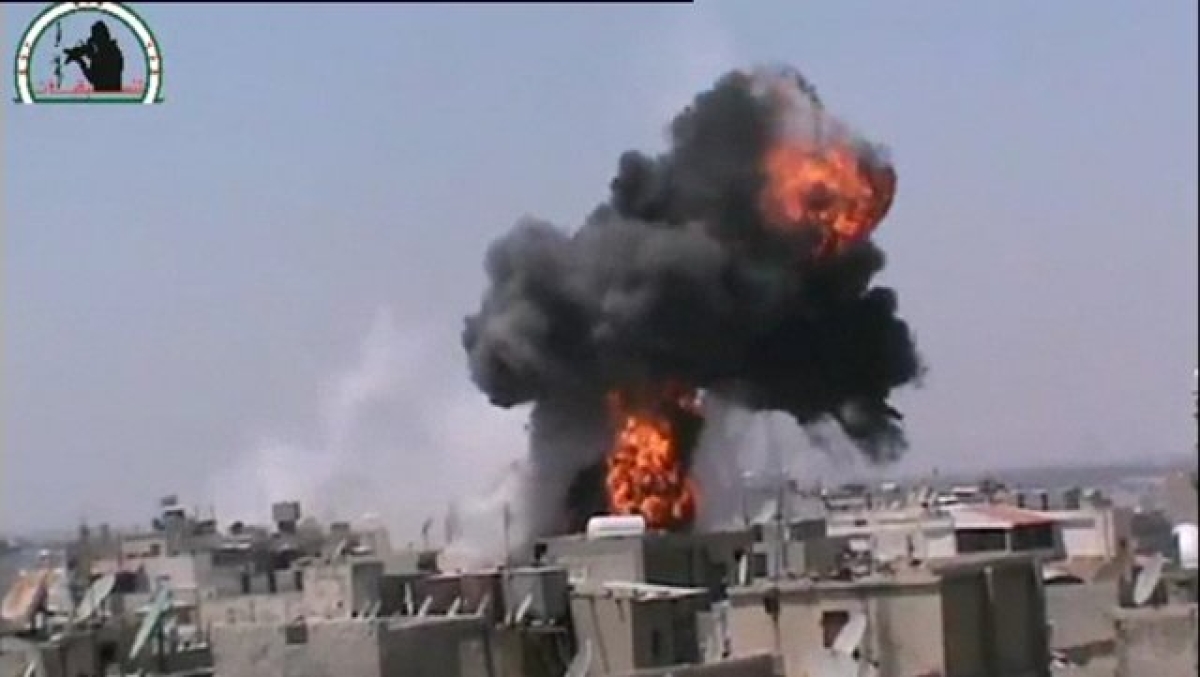 Rebels calling the assault on the capital 'Operation Damascus Volcano'[/caption]
Rebels calling the assault on the capital 'Operation Damascus Volcano'[/caption]
As the international community’s efforts to resolve the crisis in Syria have reached a deadlock with stark disagreements over the UN Security Council draft resolution currently debated in New York, events in Syria are beginning to outpace the speed of the international community’s diplomacy. The Annan Peace Plan largely is irrelevant not so much for the lack of support for it, but that it no longer accounts for the situation on the ground. It’s no surprise then that the Syrian National Council declared on Tuesday that the Annan Peace Plan is dead.
Three significant events in July have importantly psychologically and physically deprived Assad of his ability to rule Syria as its President. First, the news of the defections of Manaf Tlas, a General in the elite Presidential Guard and a close personal friend of the President and Nawaf Fares, the Syrian Ambassador to Iraq and leader of the powerful Sunni Al Jarrah clan in eastern Syria, have made it harder for the President to prevent further departures from his regime- these defections will certainly not be the last high profile defections and have further isolated the Allawite core of his government.
Second, on Tuesday, in an operation termed “Operation Damascus Volcano”, the Free Syrian Army (FSA) engaged in sustained fighting with the military in the Damascene neighbourhoods of Kfar Souseh, Nahr Aisha, Midan and Qadam. Fighting even went as far as Sabeh Bahrat Square, Baghdad Street and Sahet Arnous, little over 400 meters from the Syrian Parliament. Reports emerged as well of the FSA using anti-aircraft weaponry to down a military helicopter. Gun battles so close to the heart of the Assad regime brought for the first time the experience of the conflict to the streets of central Damascus. This has significantly prompted the Assad regime to re-deploy troops from the Golan Heights to deal with the spreading of internal violence in the state. This deepening violence will strangle even further the economic life of the collapsing state and will make it harder for the government to financially subsidize support for their rule.
Finally, in the most significant event in the over 17 months of the crisis, a bombing at the National Security Building in Damascus, targeted and killed one of the most influential members of President Assad’s inner circle, General Assef Shawkat, the husband of Busra al-Assad, the elder sister of the President, as well as Daoud Rajiha, the Syrian Defense Minister. The Interior Minister and the National Security Minister were also injured in the attack. This attack by the FSA is the first time that a member of the Assad family has been assassinated.
These events have all but shattered the perception that President Assad and his family can remain in power- a man who had marked his rule by the strength and insulation of his security apparatus. Looking at the events in Syria, the focus should now be on what implications will this civil war have on Syria and the region?
Those optimistic that these events are pointing to a better future for Syria if President Assad is pushed out of power should remain wary. Even if the Assad were to lose control of Damascus and the government, fighting will be likely to continue and the civil war could last months if not years after the fall of the Assad family. Arguably, those in the Allawite community working with the government have little option but to continue to fight to preserve their privileges and the protection that an Allawite dominated government has provided them. Acceptance of a Sunni led government is not one that they will easily accept.
The army and security services would then likely split further on sectarian lines, with the Allawites retreating to their community’s base in the mountains in north-western Syria. The Christian community will also be faced with a difficult choice on whether to make peace with a new leadership in Damascus or to stick with an Allawite armed opposition. This phase of the civil war will potentially be more violent than the current phase. Fighting may also break out between the various opposition factions- due to the diversity of the coalition’s interests and goals- once the regime falls.
In response to the attacks today, France and Britain have called urgently for a political transition, but at the moment, there is very little the international community can do to convince President Assad to hand over power peacefully. Arguably, even if Moscow was to push for Assad to step down or agreed to sanctions, there is too much at stake for his rule and his community for him to peacefully relinquish power. In an interview with the BBC, Nawaf Fares noted to Frank Gardner, "Bashar al-Assad's regime is like a cornered and wounded wolf. It will do anything to survive."
This raises the question then, what can the international community do as Syria descends into chaos? At the moment, very few options exist beyond a form of outside intervention- either before or after the fall of the Assad regime- to prevent a wider civil war. Beyond such action, the situation is arguably outside the control and influence of the international community, and as the violence deepens and further divisions occur within the country, an all-inclusive government or stable transition post-Assad looks unlikely. Such a civil war as well will not be able to keep the region immune from Syria’s ills.









